Introduction:
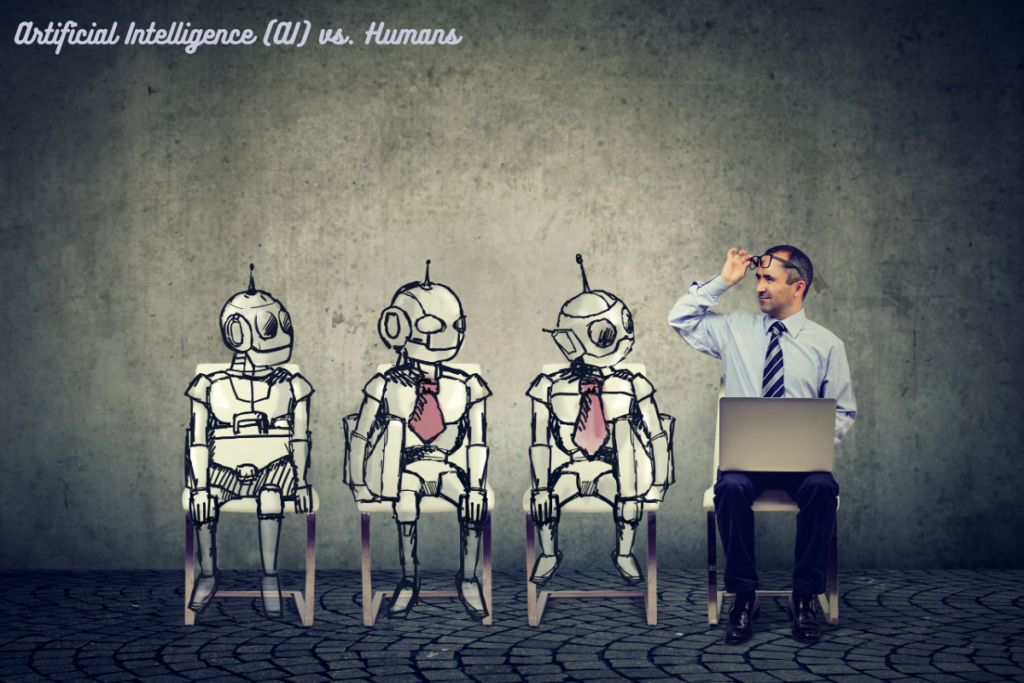
The development of artificial intelligence (AI) is driving rapid change in the future of employment, which is being powered by automation. A critical conversation regarding the function of artificial intelligence in our society has arisen as a result of the technological revolution that has brought along both opportunities and difficulties. “Artificial Intelligence (AI) vs. Humans” is not a conflict that needs to be fought, but rather a partnership that needs to be fostered.
“Artificial Intelligence and the future of work and living“, “Artificial intelligence, with its incredible processing power, has the ability to automate monotonous jobs, analyze large volumes of data, and produce creative solutions. This enables human workers to focus on higher-level activities that need creativity, empathy, and critical thinking.”
Understanding and capitalizing on the qualities that both humans and artificial intelligence possess is essential to achieving success in the future. “Artificial Intelligence (AI) vs. Humans” should not be viewed as a game with clear winners and losers.
“AI in Education: Personalised Learning, Adaptive Tutoring and Democratising access to Education: Instead, it is about achieving the best balance between automation and human expertise, wherein artificial intelligence tools complement human capabilities and boost productivity. We can unleash the promise of artificial intelligence by adopting this collaborative approach, which will allow us to build a work environment that is more productive, egalitarian, and satisfying for everyone.”
Table of Contents
The Use of Artificial Intelligence as a Tool, Not a Replacement:

Discussions regarding the influence that artificial intelligence (AI) will have on the future of employment have been spurred by its rapid development. It is possible that some people envision a dystopian future in which artificial intelligence completely replaces human workers, while others envision a collaborative future in which AI augments human talents, hence producing a work environment that is more efficient and rewarding.
There is no such thing as a “Artificial Intelligence (AI) versus Humans” game. Although artificial intelligence is very good at executing activities that are repeated in a quick and accurate manner, it does not possess the human attributes of creativity, critical thinking, or emotional intelligence.
“HOW AI will impact The Future of Work and Life“: Artificial intelligence has the ability to automate jobs such as data input, appointment scheduling, and the analysis of enormous datasets, which enables human workers to focus on activities that are more challenging and gratifying. Artificial intelligence is currently lacking in areas such as human intuition, empathy, and the capacity to negotiate complex social circumstances, which are all necessary for these activities.”
The Importance of Human Creativity and Critical Thinking:
“AI and the Future of Work: How AI will change the way we work. The article ‘Artificial Intelligence (AI) vs. Humans’ outlines the unique advantages that each can offer. Artificial intelligence is capable of analyzing enormous amounts of data and recognizing patterns; but, it is not very good at activities that require abstract thinking, problem-solving, or coming up with innovative ideas. As AI becomes more integrated into the workplace, it will automate repetitive tasks and free human workers to focus on higher-level strategic and creative activities, transforming the nature of work and collaboration.”
Human beings, on the other hand, have the capacity to conceive of novel possibilities, come up with creative solutions, and adjust to rapidly shifting conditions. The inherent creative capacity of humans continues to be indispensable for the promotion of growth, the acceleration of innovation, and the adjustment to the ever-changing requirements of the contemporary workplace.
The Need for Emotional Intelligence:
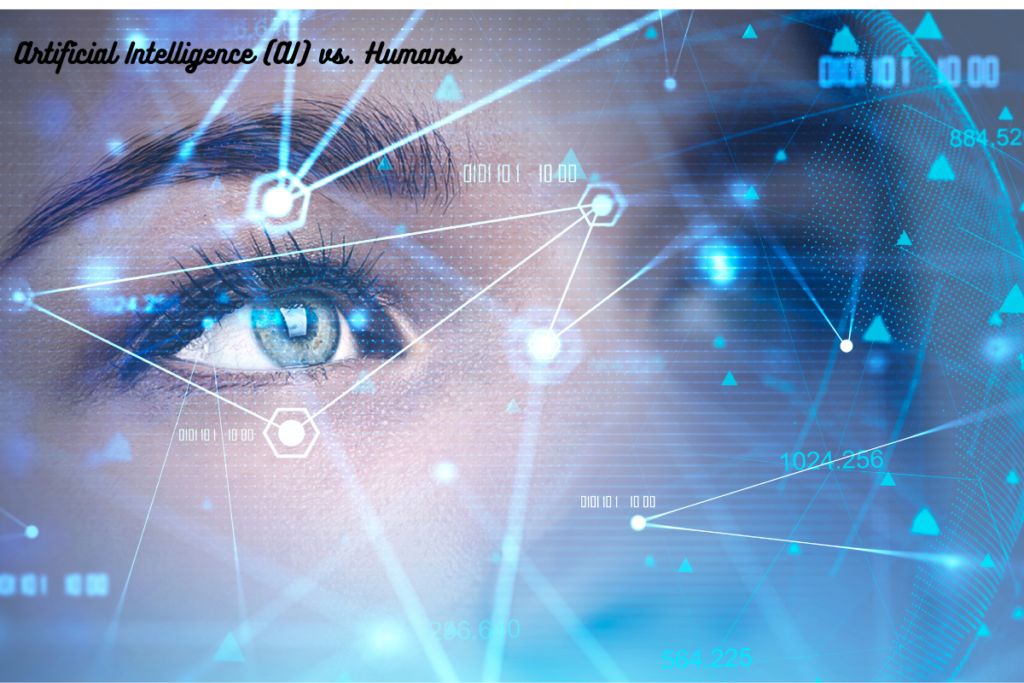
The documentary “Artificial Intelligence (AI) vs. Humans” sheds light on a significant gap in the capabilities of artificial intelligence. Artificial intelligence is capable of processing information in an efficient manner; nevertheless, it does not possess the emotional intelligence that is necessary for effective communication, the development of relationships, and the comprehension of complicated human interactions.
In fields such as customer service, healthcare, education, and leadership, particularly those in which empathy, compassion, and the capacity to connect with others are of the utmost importance, these are talents that are absolutely necessary. A workforce that is capable of leveraging the power of artificial intelligence but also keeping the fundamental human traits that are the foundation of effective collaboration and meaningful human connection is required for the future of work.
Augmenting Human Capabilities:
In the future of work, there will not be a competition between humans and artificial intelligence; rather, it will be a cooperation in which each entity will harness its capabilities to create larger results. It is possible for us to embrace artificial intelligence as a strong tool that has the potential to enhance human capabilities and revolutionize the way we work, rather than regarding it as a danger.
“Artificial Intelligence (AI) vs. Humans” ought to be rethought as a collaboration in which AI makes human capabilities more powerful. The ability of artificial intelligence to digest massive volumes of data, recognize patterns, and provide insights that would be hard for humans to discover on their own is one of its most impressive capabilities. This intelligence, which is driven by data, can offer guidance to human decision-making, which can result in more informed strategies, workflows that are optimized, and improved outcomes.
Artificial Intelligence (AI) as a Partner in Decision-Making:
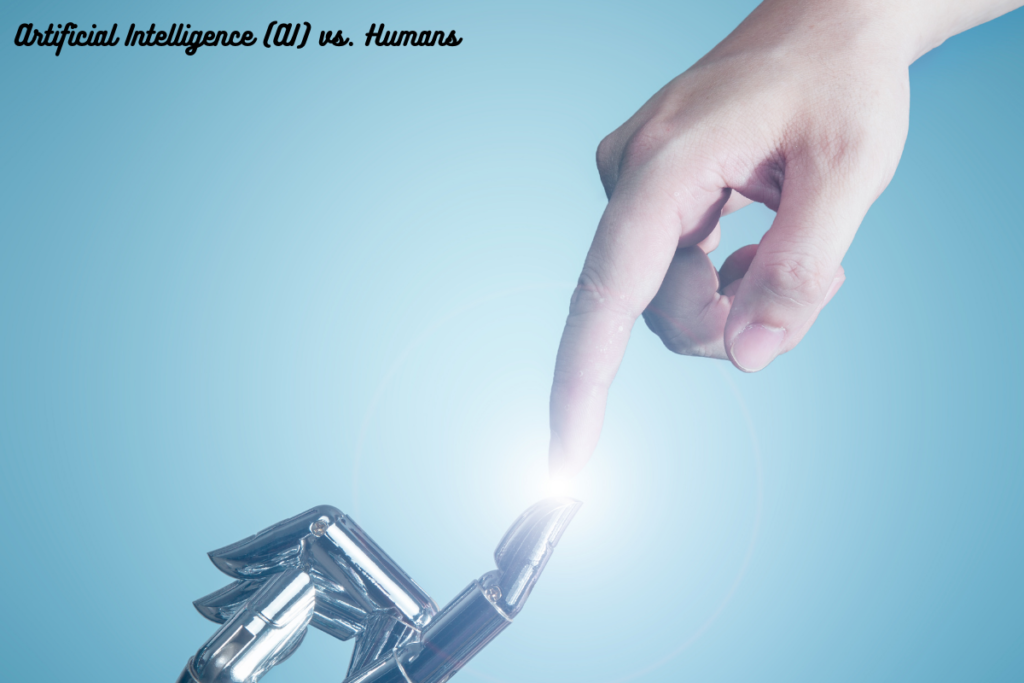
“Artificial Intelligence (AI) vs. Humans” merges into a dynamic pair. Through the provision of actionable insights derived from data, artificial intelligence enables humans to make judgments that are more informed, so lowering the likelihood of bias, boosting accuracy, and simultaneously enhancing efficiency. Through this partnership, humans are able to concentrate on higher-level activities that involve creativity, critical thinking, and emotional intelligence, while artificial intelligence takes care of the heavy lifting of data processing and pattern identification.
Streamlining Workflows and Enhancing Productivity:
The collaboration of “Artificial Intelligence (AI) vs. Humans” has the potential to improve productivity and streamline operations significantly. Artificial intelligence has the ability to automate operations that are repetitive, allowing human workers to focus on more strategic endeavors. Because of this increased efficiency, turnaround times can be reduced, quality can be improved, and overall productivity can be raised across a variety of manufacturing sectors. Creating a workforce that is more efficient, agile, and innovative can be accomplished by utilizing the assets of both artificial intelligence and people.
Shifting Skills Landscape:
Not only is the emergence of artificial intelligence redefining the talents that will be necessary to thrive in the workplace of the future, but it is also reshaping the way we work. Both a task and an opportunity are presented by this shift: the difficulty is to adapt and gain new skills, and the opportunity is to unlock new possibilities and create a work environment that is more rewarding and productive.
The debate between “Artificial Intelligence (AI) vs. Humans” calls for a change in skill sets. This may result in the automation of traditional roles; nevertheless, new possibilities will emerge in fields like as data analysis, the development of artificial intelligence, and human-AI collaboration.
Workers will need to adapt to the changing labor market and acquire new skills that complement the capabilities of artificial intelligence in order to maintain their competitive edge. This necessitates the adoption of data literacy, the comprehension of artificial intelligence systems, and the development of the ability to collaborate effectively with AI tools.
The Importance of Data Literacy and AI Literacy:
A workforce that is prepared with data literacy and AI literacy is required for the “Artificial Intelligence (AI) vs. Humans” competition. Workers are required to have the knowledge and skills necessary to collect, analyze, and evaluate data in order to derive useful insights.
They must also be comfortable working with artificial intelligence systems, have an awareness of the advantages and disadvantages of these systems, and be able to establish strategies for productive collaboration on projects. It will be essential to have this shift in skill sets in order to successfully navigate the complicated landscape of the workplace of the future.
Collaboration as the New Normal:
“Artificial Intelligence (AI) vs. Humans” is a cooperative endeavor. The workplace of the future will not be a battlefield but rather a collaborative space where humans and artificial intelligence will work together to accomplish shared objectives. In order to optimize processes and get better results, workers will need to develop strong collaboration skills.
This includes knowing how to communicate effectively with AI systems, effectively exploit their capabilities, and work together to achieve these goals. The implementation of this collaborative approach will be essential to realizing the full potential of artificial intelligence and developing a working environment that is more productive, innovative, and satisfying for everyone.
Ethical Considerations:
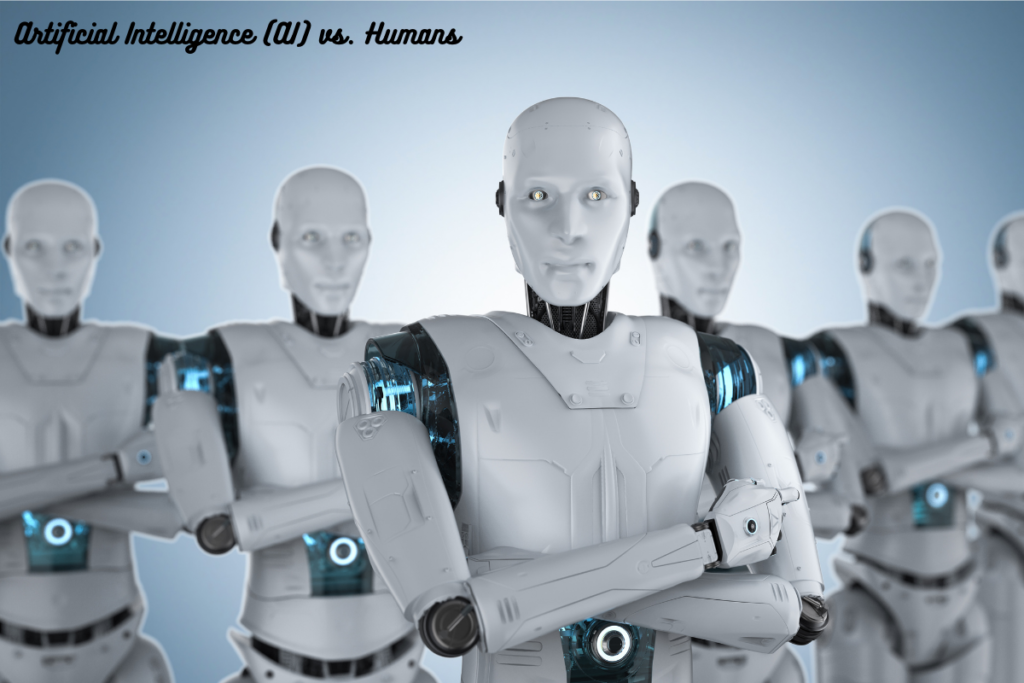
The application of artificial intelligence (AI) technology is advancing at a rapid speed, and it is essential to address the ethical implications of its use in order to guarantee that it will be beneficial to society as a whole. There is no denying the potential of artificial intelligence; nevertheless, there are also risks associated with it if we do not give serious consideration to the ethical framework within which it functions.
There are ethical problems that need to be carefully considered while discussing “Artificial Intelligence (AI) vs. Humans.” As artificial intelligence (AI) systems continue to advance in terms of their level of sophistication, it is imperative that we devise and implement them in a manner that is both responsible and equitable. In order to avoid unforeseen consequences and make certain that artificial intelligence is beneficial to humanity rather than detrimental to it, it is necessary to address concerns of bias, transparency, and accountability.
The Importance of Fairness and Transparency:
It is important that the “Artificial Intelligence (AI) vs. Humans” debate adhere to the values of justice and transparency. To ensure that artificial intelligence systems are able to treat all individuals in an equal manner, they must be built and educated to eliminate bias and discrimination. It is essential to have transparency in the process of developing and deploying artificial intelligence because it enables stakeholders to comprehend the decision-making process and to dispute any potential biases or inconsistencies.
Accountability in AI Development and Deployment:
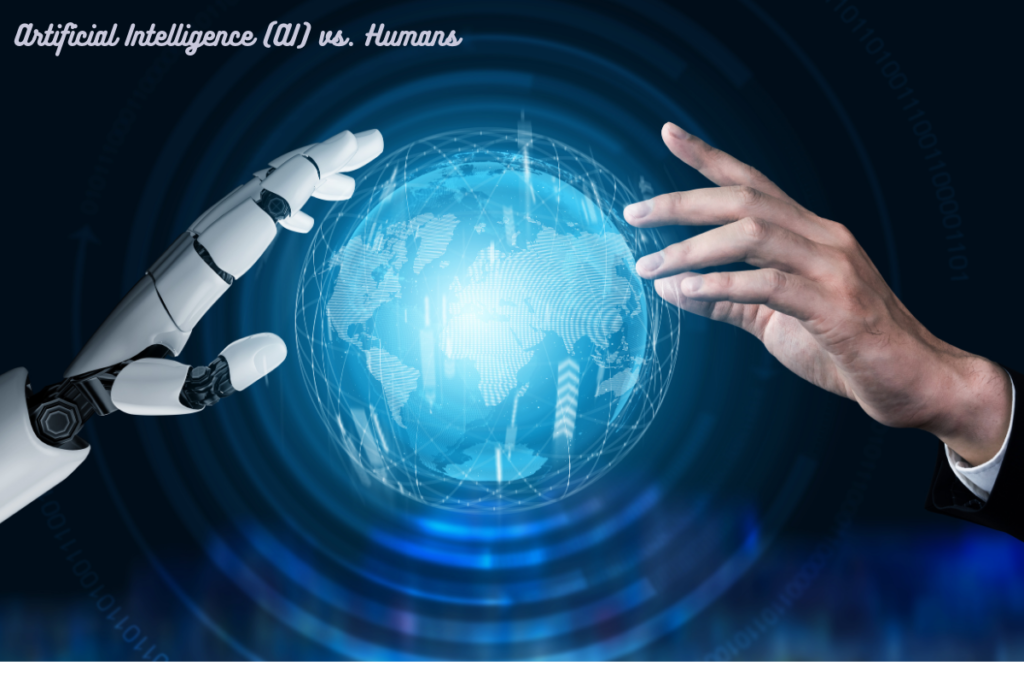
The debate for “Artificial Intelligence (AI) vs. Humans” calls for accountability. It is essential to put in place transparent processes that will allow users and developers of artificial intelligence systems to be held accountable for their behavior. To guarantee that artificial intelligence is used in a responsible and ethical manner, this could require the implementation of ethical principles, rules, and supervision systems.
We have the opportunity to harness the power of artificial intelligence for the betterment of humanity and to create a future in which AI serves humanity with fairness, transparency, and accountability if we take the initiative to address these ethical considerations.
The Future of Work is Human-Centric:
The future of work will not be a conflict between humans and artificial intelligence; rather, it will be a partnership that will enable humans to work in a manner that is more productive, creative, and meaningful. In order to improve human capabilities and make the working environment more satisfying for everyone, artificial intelligence has the potential to be a powerful tool.
In place of “Artificial Intelligence (AI) vs. Humans,” the phrase “AI for Humans” should be used. Rather than being viewed as a substitute for human laborers, artificial intelligence should be regarded as a tool that may enhance human talents, so freeing up time for work that is more interesting and satisfying. Artificial intelligence has the potential to enable humans to devote their attention to jobs that demand creativity, problem-solving, and human connection. This will result in a work experience that is more engaging and satisfying for the entire workforce.
AI Empowering Creativity and Innovation:
“Artificial Intelligence (AI) vs. Humans” has the potential to serve as a stimulant for invention and creativity. It is possible for artificial intelligence to deliver insights and data that can generate fresh ideas and inventive solutions. In turn, humans have the ability to incorporate their inventiveness and creativity into the process of translating these insights into real products, so driving forward progress and creating value. This collaboration has the potential to result in a workplace that is more dynamic and innovative, one in which both people and AI contribute to the accomplishment of lofty objectives.
Creating a More Fulfilling Work Environment:
Working together, “Artificial Intelligence (AI) vs. Humans” can provide a more satisfying atmosphere for employees to perform their jobs. Artificial intelligence has the potential to alleviate stress and burnout by automating jobs that are repetitive and monotonous. This will enable humans to concentrate on work that is more entertaining and engaging. Additionally, artificial intelligence has the potential to provide workers with opportunities to acquire new skills and pursue career paths that are in line with their interests and passions. The key to constructing a future of work that is both sustainable and prosperous is to place an emphasis on the well-being and fulfillment of individuals.
Conclusion:
It is not a conflict between artificial intelligence and humans that will determine the future of work; rather, it is a cooperative collaboration in which each party plays an important part in the formation of a workplace that is more productive, creative, and satisfying.
Despite the fact that artificial intelligence is particularly good at processing data, automating processes, and recognizing patterns, humans continue to possess distinctive advantages in areas such as creativity, critical thinking, emotional intelligence, and adaptability. The debate between “Artificial intelligence (AI) vs. humans” ought to be regarded as a complimentary force, in which AI extends the capacities of humans and enables individuals to realize their full potential.
A human-centered strategy is the key to unlocking the full potential of this cooperation, which is why it is essential to adopt this approach. A contest between artificial intelligence and humans should not be a zero-sum game in which one side triumphs at the expense of the other.
As an alternative, we should concentrate on leveraging the potential of artificial intelligence in order to improve human capacities, develop work experiences that are more satisfying, and make certain that the advantages of this technological revolution are distributed without inequality. Through the adoption of this collaborative vision, we will be able to construct a future of work that is not just innovative but also human-centered, one in which artificial intelligence will enable humans to flourish and realize their full potential.
People Also Ask:
The ability of machine learning to do repetitive jobs, analyze vast datasets, and generate insights frees up human beings to concentrate on creative endeavors, problem-solving, and making complex decisions.
The provision of training, the promotion of human-machine collaboration, the concentration on jobs that require human insight, and the upholding of ethical standards are all ways in which businesses can assure a balanced integration of artificial intelligence.
Pingback: The Impact of Machine Learning on Finance